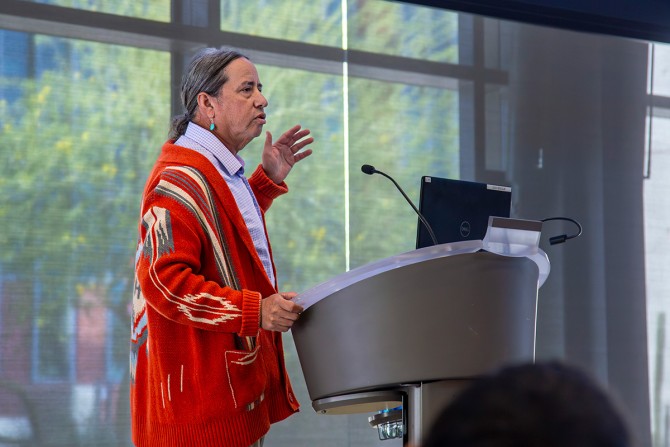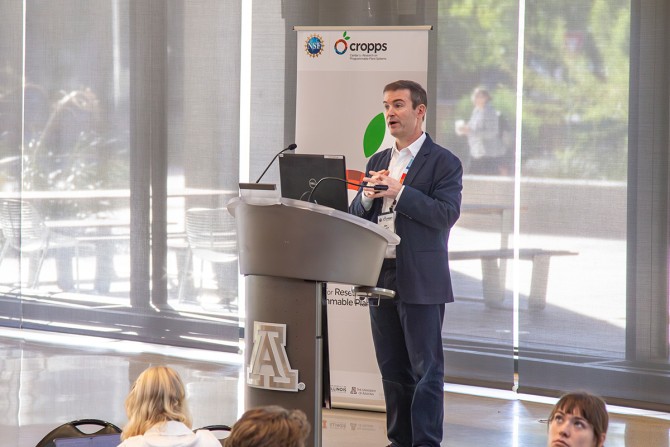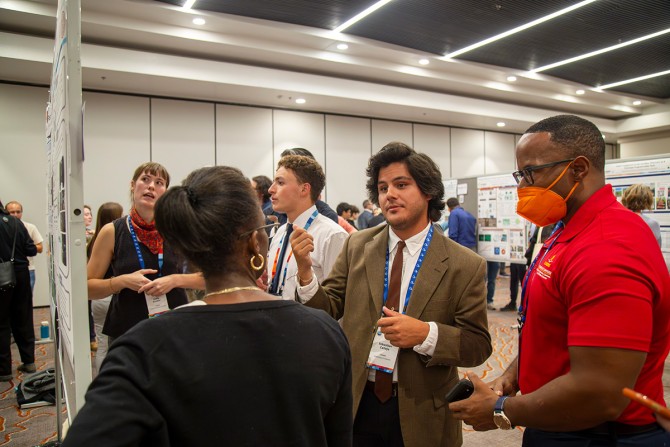
Members of the CROPPS community gathered at the University of Arizona Oct. 20-22. Photo: Tawni Eakman
News directly from Cornell's colleges and centers
From tradition to innovation: CROPPS Symposium explores sustainable agriculture for hotter, drier climates
By Matt Hayes
As a student in the late 1990s, Michael Kotutwa Johnson listened to professors dismiss the idea that corn could survive sustainably on less than 20 inches of rain each year. But for Johnson, a Hopi farmer from the high desert of northern Arizona, this wasn’t theory—it was lived experience. He knew firsthand that corn could flourish in arid conditions, just as his ancestors had grown it for generations.
Now, 25 years later, Johnson is an assistant professor of Indigenous resiliency at the University of Arizona, where he is using both his academic credentials and ancestral knowledge to challenge conventional wisdom. As the keynote speaker at the 2024 Annual Meeting and Symposium of the Center for Research on Programmable Plant Systems (CROPPS), Johnson set the tone for a gathering focused on agricultural resilience in the face of mounting climate challenges.
“Most Indigenous agriculture is place-based; as a result, we have overcome many environmental challenges and developed cropping systems, and, like us, the crops we raise have adapted in the locations we live in,” Johnson said. “For example, we plant corn determined by the soil moisture found 6 to 18 inches deep. All our cropping techniques are designed to conserve soil moisture because we only receive 6 to 10 inches of annual precipitation.”
His talk was a powerful reminder that the lessons of the past hold essential keys to the future, according to Jesse Woodson, the University of Arizona campus lead for CROPPS.
“I think it is easy for plant scientists to forget that there is an enormous amount of existing knowledge about agriculture and plant growth outside our regular academic circles. Dr. Johnson’s work is a humbling reminder that we can all gain knowledge by interacting with diverse communities and stakeholders,” said Woodson, associate professor of plant sciences at the University of Arizona.
CROPPS is a National Science Foundation (NSF) Science and Technology Center led by Cornell University, with partners at the University of Arizona, University of Illinois Urbana-Champaign, Tuskegee University, Colorado State University and the Boyce Thompson Institute. This year’s CROPPS annual meeting and symposium, held in October in the Sonoran Desert region of Arizona, provided an ideal stage for discussions on sustainable agriculture in hot, dry environments. The event brought together a vibrant mix of faculty and trainees — from undergraduates to postdoctoral researchers — fostering collaboration across disciplines to explore innovative approaches for building agricultural resilience.
“When water is available and soils are fertile, drylands like those in Arizona are among the most productive agricultural regions on the planet,” said Jon Chorover, associate dean for Research in the College of Agriculture, Life & Environmental Sciences (CALES) at the University of Arizona.
He highlighted the Yuma Agricultural Corridor along the Colorado River, which supplies nearly all leafy green vegetables for the U.S. during winter months. "We can't afford to lose vital nutritional resources that uphold our food systems, especially as climate change threatens water availability. The innovations being developed by CROPPS aim to forge a sustainable path, combining Indigenous knowledge with innovative approaches to ensure our food security for today and for future generations."
Lessons from Desert-Adapted Plants
Arizona’s arid climate and unique agricultural heritage provided a fitting backdrop for this year’s CROPPS gathering. For Johnson, the location was a powerful reminder of how Indigenous practices have long nurtured life in the desert’s challenging conditions.
Johnson’s keynote emphasized that agricultural sustainability isn’t solely about technological advancements, but also about learning from practices that have endured through centuries of climate challenges. His personal connection to dry farming—methods that his ancestors perfected long before the term “climate change” existed—resonated deeply with attendees.
“Although we have adopted technology, such as a modified one-row planter to place seeds deep in the soil as we do by hand, we also realize the importance of our unique Hopi culture and always place the quality of the crops we raise over quantity and efficiency which is the standard for conventional agriculture systems. As a result, the various crops we produce are nutrient-dense,” Johnson said.
CROPPS is dedicated to advancing agriculture for resource-constrained environments, prioritizing innovations that enhance water-use and nitrogen-use efficiency and adaptability in drought-prone areas. The work of CROPPS researchers aims to develop crops that can flourish with fewer resources, ensuring sustainable food systems for a changing world.
Research for a Climate-Resilient Future
Scientific discussions at the CROPPS symposium showcased cutting-edge research and practical insights aimed at building future resilience. Among the highlights was a presentation on “Programmed Plants for Efficient Nitrogen Use,” which explored ways to boost crop performance in nutrient-limited soils, reducing environmental impact. Another significant focus was the development of “Programmed Plants for Hot, Dry Environments of the Future,” aligning with the symposium’s emphasis on agricultural resilience.
A collaborative poster session provided students with a forum to share their research with CROPPS faculty and board members, fostering valuable feedback and mentorship from leading experts in the fields of engineering, plant science, robotics, social science and computer science. Together, these innovations point to a future where science and technology work in tandem to address the pressing needs of agriculture in challenging climates.
A Gathering of Knowledge and Tradition
The symposium offered more than scientific discussion; it was a multisensory experience that connected attendees to the Southwest’s rich agricultural history. A demonstration event titled “Indigenous Agricultural & Food of Tucson & the Southwest” invited participants to explore the traditional practices that sustain crops in arid environments. Attendees had the chance to learn about Indigenous stewardship methods that transform desert landscapes into fertile grounds and taste traditional foods made from native crops and foraging practices.
Cultivating Tomorrow’s Agriculture
The 2024 CROPPS Annual Meeting and Symposium demonstrated how sustainable agriculture can thrive through adaptability and innovation. Set in Arizona’s rugged desert environment, the event underscored the importance of new, resilient strategies for agriculture. With a commitment to groundbreaking science, CROPPS is cultivating solutions designed to withstand the pressures of a warming climate.
Media Contact
Get Cornell news delivered right to your inbox.
Subscribe

